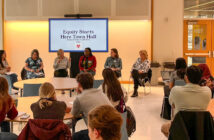I can still remember the first time I watched the opening ceremonies for the Olympic Games. I sat in front of the television mesmerized by the lights, colors and noises. But what I liked the most was when all of the athletes began walking into the stadium with their respective country’s team.

Katie Morris
They carried themselves with such pride while still expressing awe and gratitude. I remember thinking how cool it must be to spend your whole life working toward something and then having it all culminate in one moment. I remember wanting to be just like them.
I’m approaching 20 now, and I’ve come to accept that I will never have that opportunity. But it was never something I spent my life working for. Sure, I’m an athlete and I’ve put in countless hours of training, but I never trained at the level of a future Olympian. So it’s not like this opportunity was ripped away from me because it was never really an opportunity. It was simply a far-fetched dream that nearly every child has at least once in his or her life.
Yet for some athletes, this opportunity was nearly ripped from their hands. Athletes who dedicated their lives to a sport nearly missed out on the opportunity to compete in the Olympic Games. This isn’t because they used performance-enhancing drugs or because they suffered an injury, but it is because of war and violence and terror. It’s because they are refugees.
Refugees from all over the world are suffering. Oftentimes we categorize these people into one group, and we fail to see all of the qualities that make each of them individuals. But they are so much more than just an overarching term. They are doctors, students, engineers and so much more.
This year, the executive board of the International Olympic Committee created a team for refugee Olympic athletes. This team is giving refugees a chance to pursue their sport, and it’s giving them their dream back. It’s giving them hope.
The team is going to be treated just like any other country and will go by the name of Team Refugee Olympic Athletes. They will receive uniforms, housing, coaches and technical officials. The team will be also get to march into the Olympic Village just like any other country. They will get to experience those feelings of pride, awe and gratitude.
The athletes will be marching behind the Olympic flag and the Olympic anthem will be played if they receive medals.
The athletes will also receive funding from the Olympic Solidarity Comission, which will help them with their training. There are currently 43 candidates for the team and the committee expects to have five to 10 athletes representing the team in Rio de Janeiro.
As an athlete, this decision fills me with happiness. I am beyond excited they are being given the opportunity to pursue their dreams and to show the world how talented they are.
As a person, this decision fills me with hope. The Olympics is the one place where almost every country can come together to enjoy the same thing: athletics. People from all over the world will be watching the Olympics, and they will see Team Refugee Olympic Athletes as they walk into the stadium and as they perform.
They have the opportunity to think about the refugee crisis at hand, and they will be able to see these refugees as what they are — people.
By forming this team, the Olympics is recognizing these refugees as more than just a group of people in despair. They are recognizing their talents and their desires. They aren’t dehumanizing them or fearing them.
In fact, they are doing the opposite. They are embracing them and showing the world the qualities that make them individuals.
It is my hope this team will show the world refugees are people too, and they have dreams and aspirations just like the rest of us. The Olympic Committee is taking a huge step in refugee reform, and it is my hope that countries around the world will follow suit and begin to reform their own policies regarding refugee resettlement.
Everyone deserves the opportunity to pursue their dream. Whether that dream is to participate in the Olympics, to become a citizen in a new country or to return to one’s home country. No one should have their dream ripped away from them.
—
Katie Morris, ’18, is an assistant news editor for The Brown and White. She can be reached at kmm218@lehigh.edu.





Comment policy
Comments posted to The Brown and White website are reviewed by a moderator before being approved. Incendiary speech or harassing language, including comments targeted at individuals, may be deemed unacceptable and not published. Spam and other soliciting will also be declined.
The Brown and White also reserves the right to not publish entirely anonymous comments.